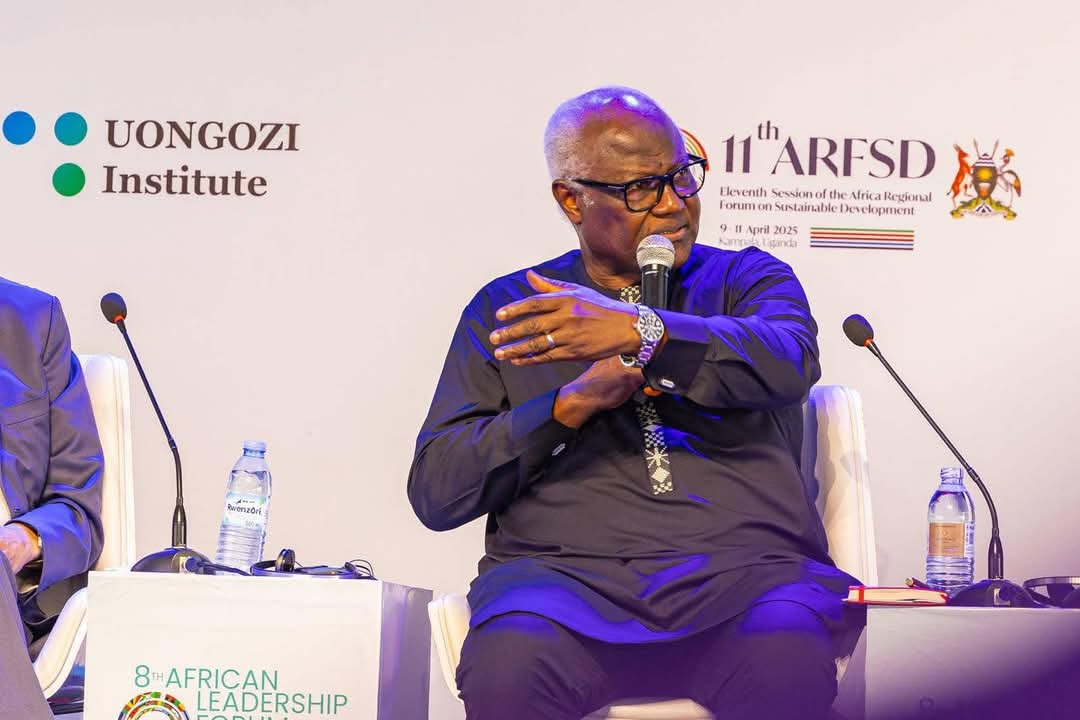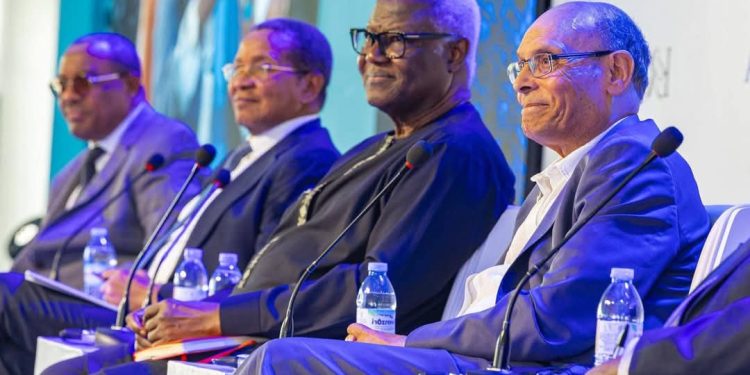African Leadership Forum 2025…
Kampala, Uganda — On April 7–8, 2025, the 8th African Leadership Forum (AFL) convened in Kampala under the theme “Realising the Sustainable Development Goals (SDGs) in Africa: Progress and the Way Forward.” Co-hosted by the UONGOZI Institute, the Hailemariam & Roman Foundation, and the United Nations Economic Commission for Africa (UNECA), the Forum brought together former heads of state and government, current leaders, policy experts, and African institutions to critically reflect on Africa’s SDG journey.
A Decade Since the SDGs: A Time for Honest Reflection
Former Tanzanian President Jakaya Kikwete opened the Forum by tracing AFL’s origins, established by Presidents Olusegun Obasanjo, Benjamin Mkapa, and Festus Mogae, as a platform to interrogate African challenges and articulate solutions from African perspectives. He underscored the importance of honest dialogue as a path to credible leadership and effective solutions.
Sam Kutesa, who presided over the UN General Assembly when the SDGs were adopted in 2015, expressed strong belief in the goals’ relevance but was forthright about Africa’s implementation challenges. “The SDGs are valid,” he said, “but their execution across Africa has fallen short. The time for action is now.”
Celebrating Progress, Confronting Realities
UNECA’s Deputy Executive Secretary, Antonio Pedro, acknowledged Africa’s commendable gains, particularly in education, gender representation, and the strengthening of regional voices. He noted that this is not the Africa of post-independence or the SAP era,” but cautioned that Africa must move beyond business as usual to address persistent poverty, disease, unemployment, and climate crises.
Pedro called for value-based investment, emphasizing that Africa must invest not only for profit but for purpose. He advocated for a recalibration of the SDGs toward job creation, food security, and human capital development, and called for operationalizing the AfCFTA to end the continent’s economic balkanization.
A Clarion Call for Bold Reforms
 Former President Ernest Bai Koroma of Sierra Leone delivered a compelling message on the interconnectedness of improved health outcomes and access to social services with human capital development, stressing that no country can prosper while its citizens are held back by preventable diseases and weak public systems. He further highlighted the need to align education and skills development with the realities of modern labour markets. “Africa’s demographic dividend can only be turned into tangible growth if young people are empowered with relevant, future-facing competencies, including digital skills, entrepreneurship, and vocational training,” he said.
Former President Ernest Bai Koroma of Sierra Leone delivered a compelling message on the interconnectedness of improved health outcomes and access to social services with human capital development, stressing that no country can prosper while its citizens are held back by preventable diseases and weak public systems. He further highlighted the need to align education and skills development with the realities of modern labour markets. “Africa’s demographic dividend can only be turned into tangible growth if young people are empowered with relevant, future-facing competencies, including digital skills, entrepreneurship, and vocational training,” he said.
Former President Koroma also drew attention to agriculture as a strategic growth engine, noting the sector’s potential to create jobs, ensure food security, and drive industrialization. However, he stressed that this potential remains largely untapped due to over-reliance on subsistence farming. “Only through value addition, technological innovation, and a modernized value chain can agriculture contribute meaningfully to inclusive economic transformation,” he stated.
Hailemariam Desalegn, former Prime Minister of Ethiopia, painted a picture of a continent rich in resources yet weighed down by poverty, poor infrastructure, and over-reliance on donor funding. He called for home-grown solutions, including:
- Renewable energy development,
- Governance reform,
- Climate-resilient infrastructure,
- Regional integration through AfCFTA, and
- A people-cantered paradigm shift.
Moncef Marzouki, former President of Tunisia articulated the impact of bold and selfless leadership and bemoaned corruption as a catastrophic drawback on African development.
Straight Talk from African Experts
MAFA E. Chipeta, former FAO Regional Head for East Africa, delivered a sobering critique saying that “Africa signs onto every treaty without prioritizing or resourcing implementation,” he said. “We must stop running Africa on external instructions.” Chipeta stressed the need to:
- Prioritize SDGs that matter most for Africa’s structural transformation (especially SDGs 7, 8, 9, 12, 14, 15),
- Rethink fossil fuel strategies given Africa’s minimal global emissions,
- Reclaim value chains and stop exporting raw materials at giveaway prices,
- Promote domestic trade that supports local producers,
- Use local currencies in intra-African trade to avoid unnecessary external dependencies.
His illustration on coffee exports—where Africa earns $2 per kilo while Europe profits $10 per cup—was a powerful call to action for value addition and economic justice.
Museveni: From Theory to Practice
President Yoweri Museveni of Uganda linked sustainable development to social transformation, drawing on Uganda’s own economic journey. He outlined practical strategies including:
- Ban on raw mineral exports to retain value locally, or until such a time there is fair global trade – even if it means during the time of later generations. “Let the minerals stay in the ground,” he remarked.
- State-driven support for agriculture to lift rural populations into the money economy,
- Infrastructure development tied to AfCFTA (e.g., rail links from Djibouti to Dakar),
- And education and health reforms as key human capital enablers.
Museveni challenged his countrymen to expand their economies with ambition, aiming for a $500 billion economy in Uganda through productivity and structural change.
A Forum of Resolve, Not Rhetoric
Throughout the day’s deliberations, the AFL served not as another round of platitudes, but as a space for introspection, bold ideas, and a clear-eyed resolve to make Africa’s development journey more self-determined.
The Way Forward
The AFL called for:
- A re-prioritization of SDGs in line with Africa’s unique development needs,
- Massive investment in youth education, skills, and job creation,
- Value addition and local industrialization as economic cornerstones,
- Governance reforms rooted in inclusivity, transparency, and pan-African integration.
Africa does not need charity. It needs cooperation, fairness in trade, and leadership with courage and vision.
“Africa must not just rise—it must lead,” concluded Antonio Pedro











